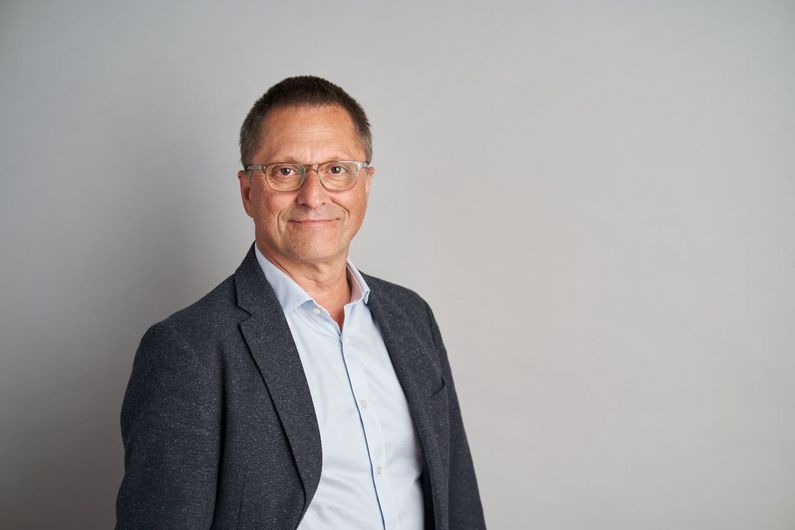Dr. André Veillette is using social media to set the record straight on COVID-19 vaccines and the science
- UdeMNouvelles
02/14/2022
- Martin LaSalle
Dr. André Veillette has taken to social media to fight disinformation and answer questions about COVID-19 vaccination and the science.
Dr. André Veillette, professor in the Department of Medicine at the University of Montreal and director of the Molecular Oncology Research Unit at the Montreal Clinical Research Institute (IRCM), has been a member of the Canadian Government’s COVID-19 Vaccine Task Force since summer 2020. The Task Force was increasingly in the public eye as Canada established its vaccine strategy and the body of evidence on the efficacy and safety of the various vaccines grew.
Veillette had only sporadic contact with the media in a professional capacity in the past. But after the pandemic broke out, he saw the outpouring of questions and comments of all kinds on social media in Quebec and elsewhere in Canada, much of it contradictory and based on inaccurate information. So he decided to jump in and add his voice as a well-informed expert who could help explain how the vaccines work, their role in preventing complications from COVID-19, and their critical importance in the fight against the pandemic that has now been with us for two years.
Today, more than 5600 people follow Dr. Veillette on Twitter.
What was your goal in making your voice heard on social media? Why did you feel it was important?
Because on social media you can reach many people, inform them about the work that has gone into developing and obtaining approval for the vaccines, and convince them of the importance of getting vaccinated. I get calls from traditional media outlets, but there it isn’t always easy to go into detail or make subtle distinctions. On social media you can continue the discussion and say everything you want to say.
Then I branched out and started talking about other scientific aspects of the pandemic, such as the virus and its variants, the rapid tests, long COVID and the public health restrictions.
People often ask me questions directly on social media, mostly people who follow me and want to know more. I’m always happy to answer. An informed public will have the knowledge to assess the science and the pandemic-related public health measures. I don’t believe that only scientists or public health experts should comment on science and health measures. The public has an important role to play.
Are you trying to reach the people spreading the disinformation as much as the people who might believe it?
Try as we might to fight disinformation with scientific arguments, I don’t think the people spreading it will change their minds. And I don’t want to spend my time talking to people who aren’t interested in what I have to say. So I avoid them and the extremists.
I’d say the most insidious people, though, are the ones who “like” my posts, but then add comments that downplay the severity of the situation, or call scientifically proven facts into question. They aren’t extremists and they don’t present themselves as opponents of public health measures or anti-vaxxers; they’re more subtle. And that makes them more dangerous, because they appear credible and create interference with scientific and public health messaging.
I believe most people can recognize outright disinformation. It influences only people who were already so inclined. But the more subtle propagators I was talking about strike me as more problematic because their arguments appear logical and they know how to use grey areas to sow seeds of doubt where there shouldn’t be any. Their reasoning is full of sophisms and fallacies.
What is your strategy to avoid getting sucked into quarrels?
I don’t let myself get drawn in and I tell the truth, even if it’s controversial. People know I’m pro-testing and pro-vaccination—even mandatory vaccination.
I’ve said frankly that I think Minister of Health and Social Services Christian Dubé has done a good job so far and I don’t understand the people who criticize him no matter what. I try to be balanced. Yes, the Health Ministry has made mistakes, but the vaccination campaign went very smoothly. As for the public health restrictions, without them we would have had a situation similar to what Britain and France experienced in fall 2021. But the current situation with Omicron is getting more and more complex, and our health care system has become shakier than ever. In the current crisis, my recommendation to policy-makers is still the same: let the precautionary principle and the science be your guides.
When I first started using social media, some people attacked me. But they quickly realized that was a mistake! I stick to my guns and give credit to the decision-makers who are doing their best under the circumstances, while offering constructive criticism. It’s healthy to criticize actions, or lack of action, but not to target individuals.
What advice do you have for colleagues who want to comment on social media?
You have to stay true to yourself if you want to remain credible over the long haul and influence people. Be careful not to make mistakes or say anything inaccurate. If you do make a mistake, you have to admit it and promptly correct it. If you discredit yourself, people don’t forget!
You can’t just stick to Twitter and comment on the news in 280 characters or less. You have to complement your comments on social media with traditional media. Personally, I like the kind of discussion you can have on the radio, where you have more time and you can explain things.













